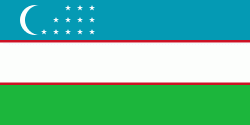Navoi International Airport (Navoi International Airport)
Navoi International Airport is an airport of entry in Navoi, Uzbekistan. It is named after Ali-Shir Nava'i.
Navoi Airport was opened in 1962 and became the Uzbekistan Airways’ when the national air company was established on 28 January 1992 by the Decree of the President of Republic of Uzbekistan. In 2007, Navoi Airport began capacity enhancement and airfield improvement projects, implementing complete renovation of runway and taxiways, installation of modern lighting system and construction of new air control tower and other facilities.
In 2009, Korean Air Cargo took over the management of the airport and, under the 10-year development plan, further accelerated the modernization programme. Construction of the largest air cargo terminal in Central Asia that can handle 100,000 tonnes of cargo annually using latest equipment has been recently completed and inaugurated on 12 August 2010. The freighter apron has also been constructed to accommodate 5 B747-400 planes and 4 additional fuel tanks were built, which can supply a great deal of aviation fuel all together and fill up more than 25 B747-400 airplanes. Korean Air inaugurated the 1st cargo flight from Navoi in August 2008 and by increasing the frequency it now operates 12 weekly B747-400F flights to Incheon, Brussels and Milan.
Uzbekistan Airways started cargo operation based in Navoi hub in May 2009 and now operates 18 weekly flights to Bangkok, Delhi, Mumbai and Frankfurt. Navoi Airport now serves 3 airlines flying to 9 cities in 8 countries including passenger flights and the work is underway to create business links with new airlines and set up new routes.
Navoi Airport was opened in 1962 and became the Uzbekistan Airways’ when the national air company was established on 28 January 1992 by the Decree of the President of Republic of Uzbekistan. In 2007, Navoi Airport began capacity enhancement and airfield improvement projects, implementing complete renovation of runway and taxiways, installation of modern lighting system and construction of new air control tower and other facilities.
In 2009, Korean Air Cargo took over the management of the airport and, under the 10-year development plan, further accelerated the modernization programme. Construction of the largest air cargo terminal in Central Asia that can handle 100,000 tonnes of cargo annually using latest equipment has been recently completed and inaugurated on 12 August 2010. The freighter apron has also been constructed to accommodate 5 B747-400 planes and 4 additional fuel tanks were built, which can supply a great deal of aviation fuel all together and fill up more than 25 B747-400 airplanes. Korean Air inaugurated the 1st cargo flight from Navoi in August 2008 and by increasing the frequency it now operates 12 weekly B747-400F flights to Incheon, Brussels and Milan.
Uzbekistan Airways started cargo operation based in Navoi hub in May 2009 and now operates 18 weekly flights to Bangkok, Delhi, Mumbai and Frankfurt. Navoi Airport now serves 3 airlines flying to 9 cities in 8 countries including passenger flights and the work is underway to create business links with new airlines and set up new routes.
Map - Navoi International Airport (Navoi International Airport)
Map
Country - Uzbekistan
 |
 |
| Flag of Uzbekistan | |
The first recorded settlers in what is now Uzbekistan were Eastern Iranian nomads, known as Scythians, who founded kingdoms in Khwarazm (8th–6th centuries BC), Bactria (8th–6th centuries BC), Sogdia (8th–6th centuries BC), Fergana (3rd century BC – sixth century AD), and Margiana (3rd century BC – sixth century AD). The area was incorporated into the Iranian Achaemenid Empire and, after a period of Macedonian rule, was ruled by the Iranian Parthian Empire and later by the Sasanian Empire, until the Muslim conquest of Persia in the seventh century.
Currency / Language
| ISO | Currency | Symbol | Significant figures |
|---|---|---|---|
| UZS | Uzbekistan som | so'm or Ñўм | 2 |
| ISO | Language |
|---|---|
| RU | Russian language |
| TG | Tajik language |
| UZ | Uzbek language |















